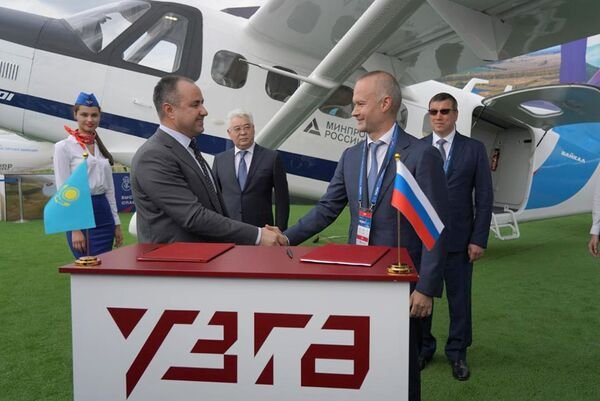
MAKS 2021: Kazakh firm takes stake in Russian aircraft manufacturer
Kazakhstan Aerospace Industries (KAI) has taken a 20% stake in Russian aircraft manufacturer Baikal-Engineering, the Kazakh government’s Ministry of Industry and Infrastructure Development (MIID) announced on 22 July, with an agreement signed at the MAKS 2021 airshow in Zhukovsky near Moscow.
Baikal-Engineering is a subsidiary business of Ural Civil Aviation Works and was established to develop the replacement for the venerable Antonov An-2 ‘Colt’, which is widely used in regional aviation. First produced in 1947, Janes data shows that an estimated 67 are still in military service with countries including Mongolia, Guinea, and Ukraine. A further 260 aircraft built under licence in China are in service with China and North Korea.
Kazakhstan Aerospace Industries’ Daniyar Amangildin (l) and Ural Civil Aviation Works’ Vadim Badekha (r) at the signing of KAI’s acquisition of a 20% stake in Baikal-Engineering by KAI at the MAKS 2021 Air Show in Moscow, Russia. (Kazakhstan Ministry of Industry and Infrastructure Development)
Kazakhstan Aerospace Industries’ Daniyar Amangildin (l) and Ural Civil Aviation Works’ Vadim Badekha (r) at the signing of KAI’s acquisition of a 20% stake in Baikal-Engineering by KAI at the MAKS 2021 Air Show in Moscow, Russia. (Kazakhstan Ministry of Industry and Infrastructure Development)
The new replacement aircraft, designated the LMS-901, is to be an aluminium-based aircraft with the same short take-off and landing (STOL) capabilities of the An-2. According to the specifications laid out by the Russian government at the time of the development contract award in 2019, the aircraft will have a cruising speed of at least 300 km/h, a maximum take-off weight of 4,800 kg, and be able to carry nine passengers. The target cost per aircraft was not to exceed RUB120 million in 2020 values (then-USD1.6 million), with an operating cost of RUB30,000 per flight hour.
Testing is scheduled for 2021, with certification to be achieved in 2022 ahead of serial production in 2023. An unmanned version of the aircraft is planned for 2024.

